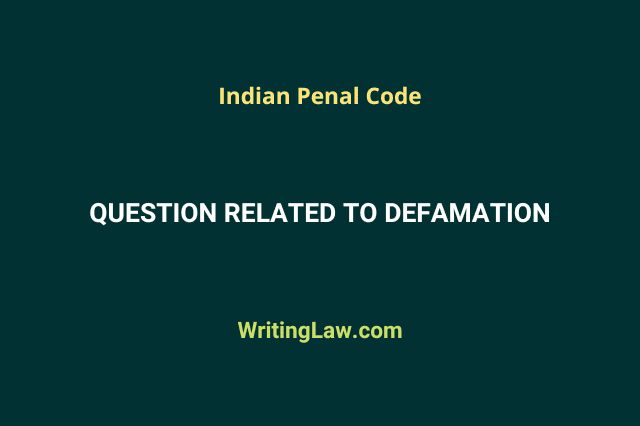
Read about a legal analysis of a defamation case where A’s comments on Z’s book are examined, considering the elements of defamation and relevant exceptions under Indian law.
Question: Z published a book. A, who knew the antecedents and character of Z, commented on the book published by Z in the following terms: “I am not surprised that Z’s book is foolish and indecent for he is a weak man and has no regard for the character.” Z prosecutes A. Will A succeed?
Answer: This problem is related to defamation. Defamation is defined in section 499 of the Indian Penal Code, 1860 and its punishment is defined in section 500 of the Act. Section 499 of the IPC, 1860 reads as follows:
Whoever, by words either spoken or intended to be read, or by signs or by visible representations, makes or publishes any imputation concerning any person intending to harm, or knowing or having reason to believe that such imputation will harm, the reputation of such person, is said, except in the cases hereinafter expected, to defame that person.
Thus, defamation is the act of making or publishing an imputation, either through spoken words, written words intended to be read, signs, or visible representations, that is aimed at harming the reputation of an individual or is known or believed to cause harm to their reputation. It involves making false statements or imputations that have the potential to damage the standing, character, or public perception of the person being targeted.
However, there are certain exceptions to defamation as specified in the law. Defamation laws aim to protect an individual’s reputation and provide legal recourse for those whose false and damaging statements have unjustly harmed.
The main ingredients of the offence of defamation, thus, are:
- Making or publishing any imputation concerning any person,
- Such imputation must have been made by
- (a) Words, either spoken or intended to be read; or
- (b) By signs; or
- (c) Visible representations;
- Such imputation must have been made
- (a) to harm; or
- (b) with intention; or
- (c) with knowledge; or
- (d) having reason to believe that will harm the reputation of the person concerning whom it is made.
The statement of A regarding Z, thus, fulfils the requirements of the offence of defamation, and it can be said that A has committed the offence. But before finally fixing the liability on A, we should examine if the statement of A falls within any one of the ten exceptions appended to section 499.
A book is always open to criticism, and exception six to section 499 provides:
Merits of public performance: It is not defamation to express in good faith any opinion respecting the merits of any performance which its author has submitted to the judgment of the public, or respecting the character of the author so far as his character appears in such performance, and no further.
Explanation: A performance may be substituted to the judgment of the public expressly or by acts on the part of the author which imply such submission to the judgment of the public.
It is implied that a person who publishes a book submits it to the public’s judgment. Expressing an opinion in good faith on the merits of a literary work is not defamation. The object of this exception is that the comment should aid the public in its judgement of the public performance submitted to its judgement. All public performances may be criticised, provided the comments are made in good faith.
Regarding the comments, ‘I am not surprised that Z’s book is foolish and indecent.’ This comment is made on the merits of the book and in good faith; hence, they are covered by the exception and do not amount to defamation.
But the words ‘for he is a weak man and has no regard for the character’ are opinions about the author, Z, not founded on Z’s book.
A has not expressed his opinion on the book’s merits and, hence, can’t take the benefit of the exception. A has committed an offence of defamation on Z.
Had the words been ‘Z must be a weak man, Z must have no regard for the character,’ the situation would have been different if the opinion were expressed in good faith.
Meanwhile, in the given problem, A has undoubtedly said that Z is weak and has no regard for the character. Ultimately, we conclude that A is guilty of defamation under section 499 of the Indian Penal Code, 1860.
- What Is the Burden of Proof Under the PMLA? - 18th April 2024
- Ranjit D Udeshi vs State of Maharashtra – Case Explained - 11th April 2024
- What Is Proceeds of Crime Under PMLA (With Case Laws) - 7th April 2024







